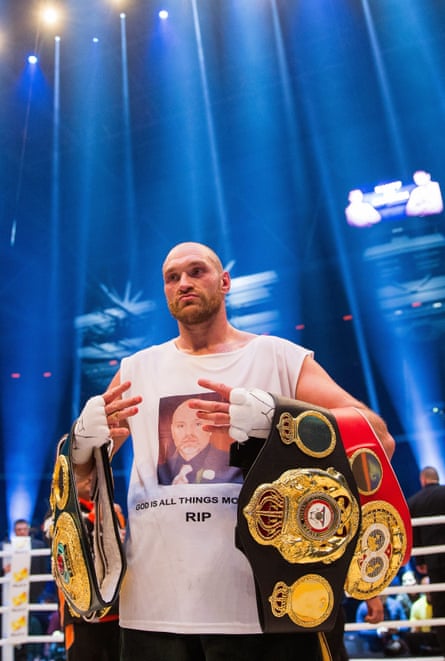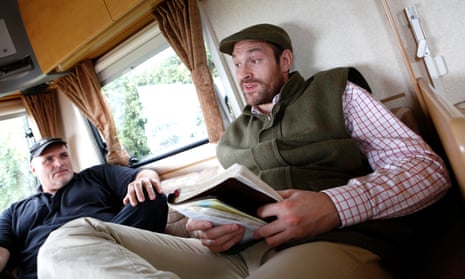Everyone has an opinion on Tyson Fury. The holder of three world heavyweight boxing titles (although he was stripped of one last week on a technicality), he has rarely been out of the headlines since beating Wladimir Klitschko. However, the cause has not been his prowess in the ring but a string of comments that have seen him branded a sexist homophobe and led to calls for him to be kicked off the shortlist for next weekend’s Sports Personality of the Year awards.
But why does Fury, 27, say the things he does? In part, the explanation lies in the most interesting thing about him: his religious faith. Born into an Irish Traveller family with a long boxing history, Fury became a born-again Christian thanks to his uncle Ernest, a Pentecostal preacher in Congleton, Cheshire. From there, he appears to have fashioned a series of beliefs that are a mixture of traditional Roman Catholic – in a 2011 interview with the Catholic Herald he talked of going to church every Sunday and added “going to heaven is the most important thing a man or a woman could ever do” – and a particularly literal interpretation of evangelical Christianity.
His Twitter feed is littered with quotes from biblical passages and in an interview last week with Sky Sports News he reiterated his faith: “I’m a believer in the Lord Jesus Christ. I’ll say it no matter how many people it offends. I’ll say it.”
While Fury’s beliefs are extreme and his reported comments range from the outrageous to the appalling, his faith places him at the forefront of a growing movement within the Gypsy, Roma and Traveller communities. Faith, in particular evangelical or Pentecostal faith, is on the rise within these marginalised and often vilified groups, many of whom are turning their backs on more traditional churches in their quest for a God they can call their own.
In her recent e-book, Romani Pilgrims: Europe’s New Moral Force, the journalist Katharine Quarmby writes of a “grassroots revival of something that first stirred among the Gypsy people in England in the 19th century [when the Gypsy Methodist preacher Rodney Smith preached throughout the UK and America], a fervent, deeply-felt form of Christianity”. She estimates that “at least one in 10 and perhaps as many as one third of the entire Gypsy, Roma and Traveller population across Europe (out of a total population of some 12 million) are now devout and active Pentecostals or have been in the church at some time”.
She adds: “In a reversal of roles, it is the Romani people who see themselves as the saved, the preachers of truth, who want to heal a world they see as broken by lack of faith, in a Europe where our politicians are judged to have lost much of their moral authority.”
This revived faith can be seen in the UK in the growing popularity of the evangelical Light and Life Gypsy Church, which now has 33 churches and about 20,000 followers (one tenth of the estimated gypsy population). The group regularly holds packed tent convention meetings (described by one person I spoke to as “like the Stow horse fair without the horses”) and missions in other countries, including Ireland, where they are making inroads among the traditionally Roman Catholic Traveller communities.

“You can see that because of what’s happened, the charges against the Catholic church, that people have lost faith in it throughout Ireland,” says Light and Life Church pastor Jackie Boyd. “In the UK we’re even getting a lot of committed Christians who are not Gypsies but they’re seeing the failing churches and come to us to find a place spreading the word of God.” Boyd stresses that Fury has never worshipped at his church (“He doesn’t speak for us and we don’t speak for him”).
“I think because Gypsies have been marginalised for so long, when they do find Christ they feel especially empowered because suddenly someone is saying that they have the same rights as everybody else. We are successful because we’re preaching the gospel to our own people and presenting it in a way they understand.”
Boyd, a British Romany Gypsy who works full time as a painter and decorator, holds some kind of service, from prayer meetings to discussion groups, six times a week at his church in the village of Iver outside Slough, Berkshire, and says that his ambition is simply to continue spreading God’s word. “We don’t want to be famous or noticed. We just want to preach the gospel to our own.”
It might be an insular attitude but the strength of this new evangelical movement is attracting the attention of other, more established churches. In October, Pope Francis met delegations from the Roma, Gypsy and Traveller communities in the Vatican, while the Church of England recently set up a charity – the Luton Roma Trust, headed by retired vicar Martin Burrell – who has been chaplain to the Gypsies, Travellers and Roma in the diocese of St Albans since 2009. He works mainly with the large community of Romanian Roma in the town and has helped them to establish the Luton Roma Church.
To Burrell, the key is for established churches to work with the Pentecostal movement and not against it. “There is a huge change happening here and we need to embrace its reality and welcome it. The Salvation Army, for example, has planted Roma churches in Margate and Dover and is working with Czech Roma there and I think there’s a wonderful opportunity for mainstream church to work with these local churches.”
But why exactly do the evangelical and Pentecostal movements so resonate with these particular communities? Yvonne Macnamara, chief executive of the Traveller Movement, a charity that promotes and supports Traveller rights, stresses that many Travellers remain devout Catholics, adding that membership of any religion comes down to a sense of belonging.
“It’s a comfort blanket and within these communities it’s also a way of coping with a lifestyle that is constantly under attack and almost completely eroded,” she says. “When you’ve been such an excluded community, then religion can provide a form of kinship, direction and strength. That’s one reason so many in the community have such a profound faith.”
Macnamara, like Boyd, is clear that Fury’s interpretation of the Bible is as unique as his fighting style. “Tyson is clearly misinterpreting his Bible,” she says, but adds that it would be wrong to presume his faith wasn’t genuine. “I’d be surprised if he’s ever met any LGBT people. His comments clearly demonstrate a fear of the unknown and he’s hiding behind the Bible to justify them. The thing to do isn’t to stone him for that, but to have a proper debate. There’s no point in pretending that no one else thinks this way. Instead we need to challenge that thinking.”
Jake Bowers, a Gypsy journalist and blacksmith, agrees. “I would be lying if I said that his misogyny and homophobia wasn’t quite representative of certain parts of the Gypsy community and indeed of mainstream society, but at the same time Fury would be the first to say that he’s not an educated man. There can be a very literal interpretation of the Bible among believers in the community but that’s often because this is the first book that they have learnt to read. It is the main source of their literacy and therefore their interpretation is bound to be literal.”
There is also a more problematic side to the Pentecostal movement. “The shadow side of the Pentecostal movement is that it’s about retreating from the world,” says Burrell. “The world is seen as a dangerous place in which Satan rules over a land of sinners – and that attitude doesn’t help integration as members tend to retreat into piety.” It’s a statement that finds its echo in Fury’s comments about the devil and the end of the world. The boxer might not be part of a Pentecostal church but he is clearly attuned to its teachings and rhythms.
Bowers, who has family who have joined the Light and Life church, agrees, adding that while the evangelical movement is “generally a force for good”, providing “a welcome to a people who have been legally written out of existence”, it remains too inward-looking to effect real change. Instead, he argues, what’s needed is a Martin Luther King or a Malcolm X.
“If you’re trying to overturn 500 years of hatred and prejudice, then history suggests that you do need a spiritual grounding to give you the strength to do it,” he says. “The evangelical movement is growing at a huge rate but at the moment it’s too insular. It’s all about the meek shall inherit the earth and not about the change that needs to come.”
WORDS OF FURY
On the end of the world
‘There are only three things that need to be accomplished before the devil comes home. One of them is homosexuality being legal in countries, one of them is abortion and the other is paedophilia.’
On women in general
‘I’m not sexist. I believe a woman’s best place is in the kitchen and on her back. That’s my personal belief. Making me a good cup of tea, that’s what I believe.’
On Jessica Ennis-Hill
‘That’s the runner, isn’t it? She’s good, she’s won quite a few medals, she slaps up good as well … when she’s got a dress on she looks quite fit.’
